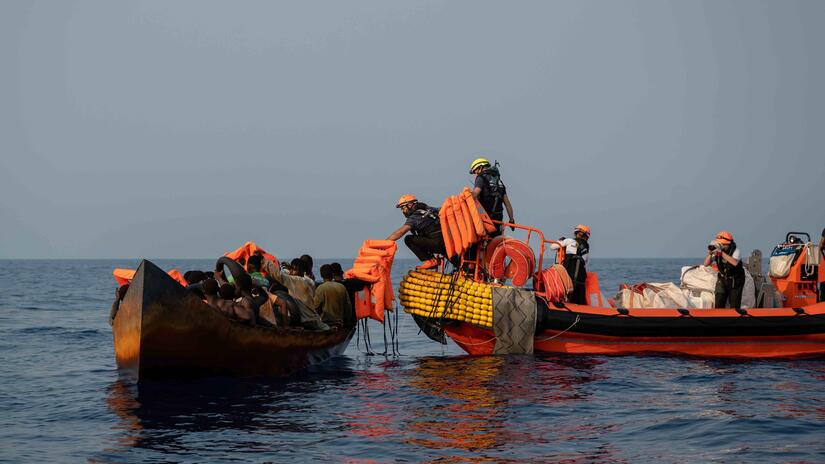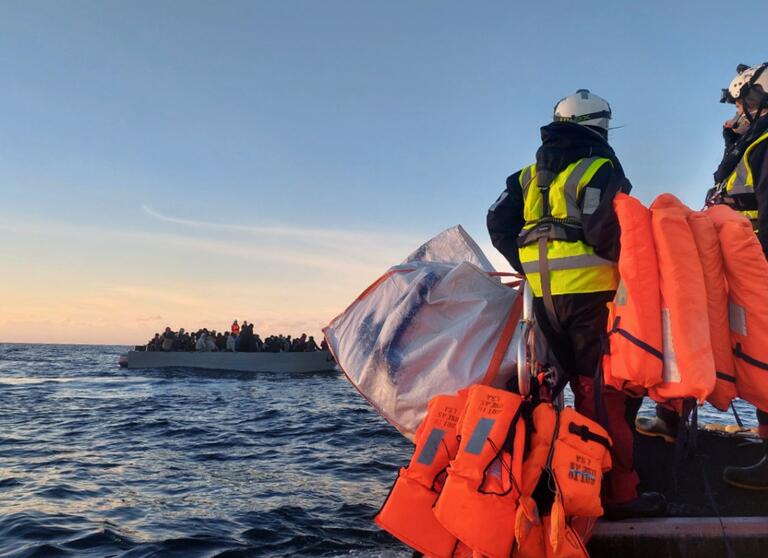Geneva/Rome, 5 March 2024: As Europe approaches spring and summer, the IFRC anticipates a surge in the number of migrants risking their lives on the dangerous Central Mediterranean Sea route. The tragic record of 2023, the deadliest year since 2017, IFRC fears for more deaths at sea. Leveraging the partnership with donors, IFRC is dedicated to mitigating as many tragedies as possible in the forthcoming months.
Last year's toll, with over 2,500 reported dead or missing along this treacherous route — and possibly many more unreported cases — has significantly raised concerns for migrant safety. The trend of increased crossings during the warmer months signals a continued risk of perilous journeys.
Driven by desperation and the absence of safer alternatives, numerous migrants embark on these hazardous voyages in overcrowded and unseaworthy vessels, seeking safety or a better future. Data from the International Organization for Migration (IOM) reveals that nearly 23,000 individuals have lost their lives or gone missing on this route since 2014, with the total for the entire Mediterranean exceeding 29,000. The shipwreck off the coast of Greece on June 14 last year, where several hundred migrants are feared to have perished when their overloaded fishing boat capsized, exemplifies the dire risks involved.
No other option
Turning a blind eye to this situation is simply not an option, and thanks to the support of donors such as Muslim World League, IFRC is able to take to the sea on board the search and rescue vessel Ocean Viking for another year. Since 2021, 5,693 people were rescued by this operation. Together with National Red Cross and Red Crescent Societies and partner organisation SOS Mediterranee, IFRC will continue to support as many people in distress as possible with food and water, basic needs, medical care and psychosocial support.
Jagan Chapagain, Secretary General of the IFRC, earlier this week on board the Ocean Viking in Syracuse, Italy, praised the donors and partners that make this operation possible:
“The Ocean Viking has proven to be a beacon of hope in a vast, unforgiving sea. It is a collaboration that goes beyond saving lives; it also reflects a commitment to upholding the principles of solidarity and humanity. I greatly value our partnership with the Muslim World League, and others, who provide us the ability to save lives, together.”
Coordinated approach
The operation on board the Ocean Viking is part of a larger effort of the IFRC network to support people on the move around the world throughout their journey. By providing food, water, first aid and other basic needs at so-called Humanitarian Service Points in countries along popular migration routes, the National Red Cross and Red Crescent Societies ensure that people can find aid along their journey. By not only running a Humanitarian Service Point on board the Ocean Viking, but also, for example, supporting migrants when they disembark in Europe, we ensure together that people find a sense of humanity along their journey.
“As the global landscape continues to evolve due to the climate crisis, increasing disasters and crises, political instability, conflicts, pandemics, growing inequalities, advancements in technology and shifting economic and social spaces, we see how migration and displacement have taken on new dimensions. Existing challenges to people’s lives and livelihoods are being amplified all over the globe and compounding many of the reasons that drive them to migrate.”explained Chapagain in Italy. “We are committed to ensuring migrants, refugees, and other displaced people—no matter who they are and irrespective of their status—are safe, treated with dignity and have their rights respected, including along dangerous and deadly migration routes on land and at sea.”
For more information, audio visual material or to coordinate an interview, please contact: [email protected]
In Budapest:
Julie Enthoven: +36 70 508 5702
In Geneva:
Tommaso Della Longa +41 79 708 4367
Mrinalini Santhanam +41 76 381 5006





